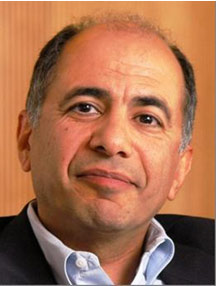Saied Tehrani: Difference between revisions
(Created page with "== Biography == James M. Daughton, Stuart Parkin and Saied Tehrani each made key contributions to Magneto-Resistive Random Access Memory (MRAM) technology. The work of Dr. Daug...") |
No edit summary |
||
| (5 intermediate revisions by 3 users not shown) | |||
| Line 1: | Line 1: | ||
== | {{Biography | ||
|Image=Tehrani.jpg | |||
|Associated organizations=Freescale Semiconductor | |||
|Fields of study=Semiconductors | |||
}} | |||
[[James M. Daughton]], [[Stuart Parkin]] and Saied Tehrani each made key contributions to Magneto-Resistive Random Access Memory (MRAM) technology. The work of Dr. Daughton in sensors and couplers, Dr. Parkin in Magnetic Tunnel Junction, and Dr. Tehrani in materials and processes, when combined, helped make MRAM a viable memory technology for both military and commercial applications. MRAM is an integrated-circuit access memory fabricated with nanotechnology. Using an electron spin to store data, it has the capability to combine many of the best attributes of different types of semiconductor memories. | |||
Dr. Tehrani is Director of Analog and Mixed Signal Technologies at Freescale Semiconductor (formerly the semiconductor division of Motorola, Inc.). His R&D team is responsible for the development of power, analog, RF, sensor, and magneto-resistive random access memory (MRAM) technologies. Dr. Tehrani became a Motorola Fellow in 2000 and a Freescale Semiconductor Fellow in 2006. He has co-authored more than 80 articles in refereed journals, given more than 20 invited presentations at various international conferences, and has 75 issued patents. He received a bachelor’s from the University of North Carolina, Charlotte and a masters and doctorate in electrical engineering from the University of Florida, Gainesville. | |||
[[Category:Random access memory]] | |||
{{DEFAULTSORT:Tehrani}} | |||
Latest revision as of 16:56, 26 February 2016
- Associated organizations
- Freescale Semiconductor
- Fields of study
- Semiconductors
Biography
James M. Daughton, Stuart Parkin and Saied Tehrani each made key contributions to Magneto-Resistive Random Access Memory (MRAM) technology. The work of Dr. Daughton in sensors and couplers, Dr. Parkin in Magnetic Tunnel Junction, and Dr. Tehrani in materials and processes, when combined, helped make MRAM a viable memory technology for both military and commercial applications. MRAM is an integrated-circuit access memory fabricated with nanotechnology. Using an electron spin to store data, it has the capability to combine many of the best attributes of different types of semiconductor memories.
Dr. Tehrani is Director of Analog and Mixed Signal Technologies at Freescale Semiconductor (formerly the semiconductor division of Motorola, Inc.). His R&D team is responsible for the development of power, analog, RF, sensor, and magneto-resistive random access memory (MRAM) technologies. Dr. Tehrani became a Motorola Fellow in 2000 and a Freescale Semiconductor Fellow in 2006. He has co-authored more than 80 articles in refereed journals, given more than 20 invited presentations at various international conferences, and has 75 issued patents. He received a bachelor’s from the University of North Carolina, Charlotte and a masters and doctorate in electrical engineering from the University of Florida, Gainesville.
